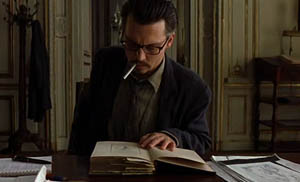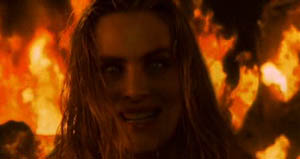|
Roman Polanski's The Ninth Gate is a decidedly frustrating film, in that it's exactly the sort of film I could really get into if it was, to put it simply, something of a better movie. It aims for territory which could be fascinating and lands someplace off to the side of the road. 
Dean Corso (Johnny Depp) is an expert in rare books with a conscience which could at best be termed "flexible." His introduction finds him fleecing a couple with regards to the value of a four-volume set of Don Quixote, snatching up the rare prize for a comparatively paltry sum as the books' owner sits nearby, mute, confined to a wheelchair, and visibly (to us, at least) distressed as all hell regarding the proceedings going on just behind his back. While the scene itself isn't significant to the overall plot, I mention it because it's an excellent example of how this film works when it's getting things right. Polanski uses the camera to tell the story as often as he lets the dialogue do so, and composition throughout is haunting and beautiful-without giving too much away, I'll point out that the film manages to make Hell, or at least something clearly symbolic of Hell-absolutely gorgeous. The film itself, however, isn't quite matched to the presentation, though for a while it makes a good go of things. Wealthy book collector Boris Balkan hires Corso to investigate the only two existing copies, other than his own, of a book titled The Nine Gates of the Kingdom of Shadows, as he's convinced that only one copy of the book is genuine, and obviously desires with great intensity to know which one it is. The book is reputed to contain the key to summoning the Devil himself, and as his attempts thus far have summoned absolutely squat, he's fairly convinced that the real book is one of the remaining two. He wants the correct book identified and procured, by whatever means are necessary, and Corso sets off for Europe to begin his detective work. I admire what Polanski is trying to do here; I really do. The supernatural thriller genre is overrun with total dreck, much of it involving unstoppable spooks chasing teenaged girls and cats leaping out of closets to skirling violins. The Ninth Gate is an attempt to fashion a respectable movie, an actual piece of art. Cryptic clues hidden within seventeenth-century engravings tantalize us with the prospect of a puzzle to solve. Corso himself, despite initial skepticism on matters supernatural, finds himself increasingly intrigued by his investigation, even as bodies begin piling up and danger mounts. After the first death, he wants nothing more than to bow out at once. By the end, he cannot turn away. If only the film was compelling enough to make we, the audience, feel much the same thing. Instead, it's plagued by often maddeningly slow pacing. This isn't a problem initially, but the fact is that the film is paced glacially throughout its entire length. As we approach the finale, there's a sense that the story should begin winding tighter and tighter, which it fails to do. When the ending finally comes, it's so abrupt that we instantly begin wondering just when and where we must have overlooked something of desperate importance that slunk by in the shadows. In his attempts to craft a classy piece of work, Polanski has lamentably failed to create any actual thrills. 
This is the real problem with the film: it takes its own sweet time getting on with things, then leaves us feeling like it hasn't actually told us anything at all. Fans of the film have spun all sorts of imaginative theories on what's lurking beneath the surface, including in-depth scrutiny of the engravings we see only briefly, but even if such musings are correct, there's something not quite satisfying about a film with more subtext than actual text. Consider the very first scene, in which a man calmly pens a suicide note and then hangs himself in an altogether unfretful manner. I'm not at all sure that this death is ever explained; indeed, all we subsequently learn seems to dismiss the more obvious possible motives. The mystery girl only ever known as "Green Eyes" is just as problematic in that she never seems all that mysterious, except when she seems so much so that it takes on an unintended air of silliness. Played by Polanski's wife, she's convincing enough when her dialogue is confined to one-word answers, or when she's maniacally writhing atop Johnny Depp, but once she starts contributing more conversation to the mix, we see just how much her acting range fails to accomodate much beyond one-word answers. A mix of Satanic thriller and film noir sounds like a great idea on paper, and in fact can turn out to be pretty compelling; just check out Alan Parker's Angel Heart (the trailer for which, coincidentally, compared it to Polanski's Chinatown). Unfortunately, if there were any genuinely great ideas here, they seem for the most part to have stayed on paper. Ahh, what might have been. -review by Matt Murray
|
|
||||||||